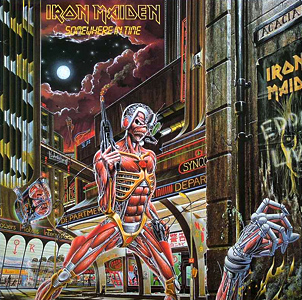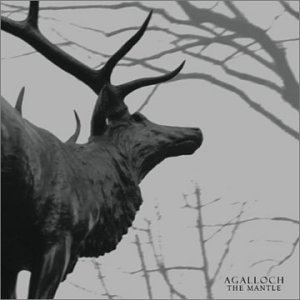Album: Somewhere In
Time
Artist: Iron Maiden
Year: 1986
Score: 100/100
“How to Create a
Masterpiece”
1986 was really a great year for metal music. Not only were several thrash classics
released that year, it also saw the release of Iron Maiden’s masterwork. “Somewhere In Time”, in my eyes, is easily
the best Iron Maiden album ever made.
For me, “Somewhere in Time” took everything that was already good about
Iron Maiden and expanded it. The
excellent sound is still there, but there is an added atmosphere and the songs
are even more intricate. Perhaps it is
an unpopular opinion to label this as the greatest of all Iron Maiden albums,
but it truly is my favorite. It is a
magnificent output from a mature band in their prime.
Instrumentally, the album is brilliant. The melodies are
enthralling, and the instruments are distributed into relatively equal
portions. The trademark dueling guitars
are still there, playing perhaps the most important role in the entire
album. More than any other Iron Maiden
album, this is the most melodic. While
the songs still have the trademark Iron Maiden galloping rhythm, it is not as
prominent. The band relies on other
techniques to pull the listener in. Much
of this comes from the excellent guitars.
Some of the best Iron Maiden solos are found on “Somewhere in Time”;
they often take up a large portion of the songs. The riffs are also great; they are well
constructed and well placed within the songs.
The bass is as fantastic as usual.
It serves as a perfect backbone to the songs, and is wonderfully high in
the mix. It’s hard not to love the bass
in an Iron Maiden album, and “Somewhere in Time” is no exception. The drums are also excellent. There are many memorable moments scattered
throughout the release. Additionally,
the drumbeats are not too similar in every song. There is a pretty good variety of beats and
fills found throughout. Vocally,
“Somewhere in Time” is amazing. This is,
hands down, Bruce Dickinson’s finest hour.
He handles the vocals with ease, going from a raspier voice to a
smoother style of singing. Something
that set “Somewhere in Time” apart from previous Iron Maiden albums was the use
of keyboards during the songs. They are
actually barely noticeable, but do play an instrumental role in the overall
feel of the album. The synths basically
serve as a backdrop to the songs; they add a lot of mood and atmosphere, but
not much in a technical sense. The
keyboards were done very well, especially given the year this album came out.
The songs themselves follow many different patterns. There are long portions of instrumental
display, as well as a variety of riffs.
Some of these riffs are very relaxing while others are quite rhythmic
and metallic. Other guitar portions are
highly melodic, reminding me of power metal.
Most of the songs are midpaced to fast, though generally slower than
what Iron Maiden had done before. Even
though the songs all have a clear verse and chorus; they are fairly complex
from a structural standpoint. They are
also rather long with the shortest being nearly five minutes long. In addition to all of these things,
“Somewhere in Time” is rather atmospheric for an Iron Maiden album. Part of this is due to the keys, but it also
has to do with the frequent shifts in dynamics and tempo. The atmosphere is one of the main reasons
that I enjoy this album so much; it really adds to Iron Maiden’s sound.
As the individual songs go, they are all close to being
perfect. Each is like a small story,
similar to the last yet distinctly different.
There are more grandiose moments, as well as catchier songs. This diversity makes “Somewhere in Time” a
unique listen. The album opens up with
“Caught Somewhere in Time”- one of the greatest songs the band would ever
do. From the very beginning, the song is
dreamlike yet attention-grabbing. The
chorus is beautiful and anthemic; it begs for the listener to sing along. Following this is the catchier, but not less
impressive “Wasted Years”. The guitar
intro is classic and highly memorable.
It effectively blends the progressive tendencies of the opener into a
more accessible tune. The third song,
“Sea of Madness”, is very close to being my favorite Iron Maiden song. There’s a great contrast between soft and
heavy, and it might just contain Bruce Dickinson’s finest vocal moment. It’s got another powerful chorus similar to
the opener, and the verses are surreal.
It’s also got some of the heaviest riffing in any Iron Maiden song. “Heaven Can Wait” comes next with a very
relaxed sounding chorus and more great guitars.
The verses in this song are quite interesting, though it does not stand
out as much as the three that came before it (still a great tune,
though!). The fifth song, “The
Loneliness of the Long Distance Runner”, is another classic. This one is long and winding, with a most
impressive guitar solo in the middle.
It’s very melodically driven, perhaps more than anything else on the
album. I consider it to be a highly
underrated song, and one of the best from the album. “Stranger in a Strange Land” is another
catchy song, more in the vein of “Wasted Years”. It sounds great coming off of “The Loneliness
of the Long Distance Runner”, as the contrast between the two songs helps keep
the album diverse. I particularly enjoy
the bass intro to the song, as well as the added atmosphere during the verses. “Déjà vu” is another standout. The singing in this one is a bit different,
less melodic or something. It’s hard
to believe that this song is not better known as it certainly lives up to the
high standards of Iron Maiden’s hit songs.
Finally, the album closes with the grand epic “Alexander the
Great”. What a song! It takes everything that is great about
“Somewhere in Time” and fits it into a single song. This track is somewhat similar to the
opener. The difference lies in the fact
that it really brings the album full circle- to an effective ending. It’s a masterpiece, a fitting finale to an
impressive show.
“Somewhere
in Time” is my favorite work from Iron Maiden for many reasons. It’s one of the metal albums to judge other
metal albums by. I honestly recommend
this one to anyone who likes rock or metal, as I feel that most people into
this genre will surely like it. Most
fans of Iron Maiden will have heard this already, but those who have not should
definitely listen to it. Perhaps it’s
not the album most representative of their sound, but it is their best. For newer fans to the band I would
recommend “Powerslave” as it is their signature release, and another flawless
album. “Somewhere in Time” is one of
those fantastic albums that never ages, and remains as perfect as it was the
first time I heard it. Highly
recommended!
Best songs: All of
them!
Thanks for reading, and be sure to comment!



